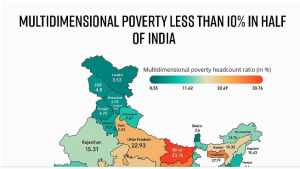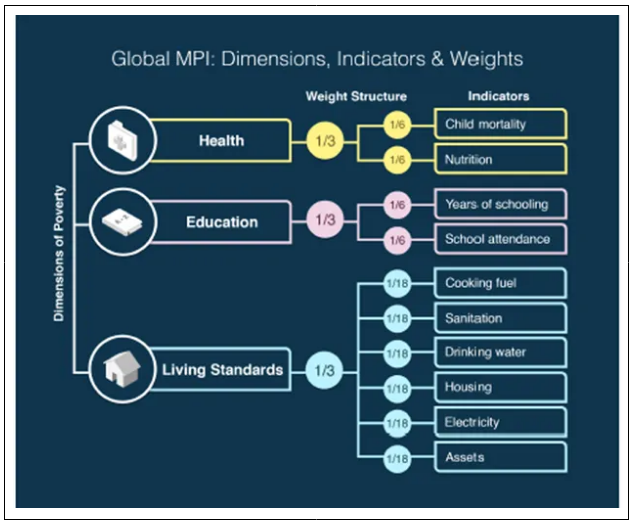Context:
National Multidimensional Poverty Index: A progress of Review 2023′ — was released by Niti Aayog.
About National Multidimensional Poverty Index:
- The National MPI measures simultaneous deprivations across the three equally weighted dimensions of:
- Health: Nutrition, Maternal Health and Child and Adolescent Mortality
- Education: Years of Schooling, School attendance,
- Standard of Living: Cooking fuel, Sanitation, Drinking water, Electricity, Housing, Assets, and Bank accounts.
- It uses statistics from the National Family Health Survey (NFHS-5 (2019-21)) to capture the various dimensions of poverty in India.
Key Findings:

- Significant Decline in Multidimensional Poverty in India:
- A record 13.5 crore people moved out of multidimensional poverty between 2015-16 and 2019-21.
- India has registered a significant decline of 9.89 percentage points in the number of India’s multidimensionally poor from 24.85% in 2015-16 to 14.96% in 2019-2021.
- Rural Areas Witness Fastest Decline in Poverty: The rural areas witnessed the fastest decline in poverty from 32.59% to 19.28%. During the same period, the urban areas saw a reduction in poverty from 8.65% to 5.27%.
- Multidimensional Poverty Estimates for States and Union Territories:
- The Report states that the fastest reduction in the proportion of multidimensional poor was observed in the States of Uttar Pradesh, Bihar, Madhya Pradesh, Odisha, and Rajasthan.
- Uttar Pradesh registered the largest decline in the number of poor with 3.43 crore people escaping multidimensional poverty.
- Reduction in MPI value: Between 2015-16 and 2019-21, the MPI value has nearly halved from 0.117 to 0.066 and the intensity of poverty has reduced from 47% to 44%.
How did India reduce multidimensional poverty so fast?
- Areas of reduction: India achieved such rapid poverty reduction lies in the data about the seven standard-of-living sub-indicators— cooking fuel, sanitation, drinking water, housing, electricity, assets, and bank accounts— rather than in the indicators for health and education.
- For instance, the NITI Aayog report shows that around 58 percent of Indians were deprived of clean cooking fuel in 2015-16, but by 2019-2021, it was only 44 per cent.
- Similarly, the percentage of individuals lacking adequate sanitation facilities dropped from 51.88 per cent to 30.13 per cent, electricity deprivation went from 12 per cent to 3.27 per cent, and the percentage of people lacking access to banking reduced from 9.66 percent to 3.69 per cent.
| Additional Information:
Parameters of Global MPI |

News Source: The Hindu
![]() 18 Jul 2023
18 Jul 2023


